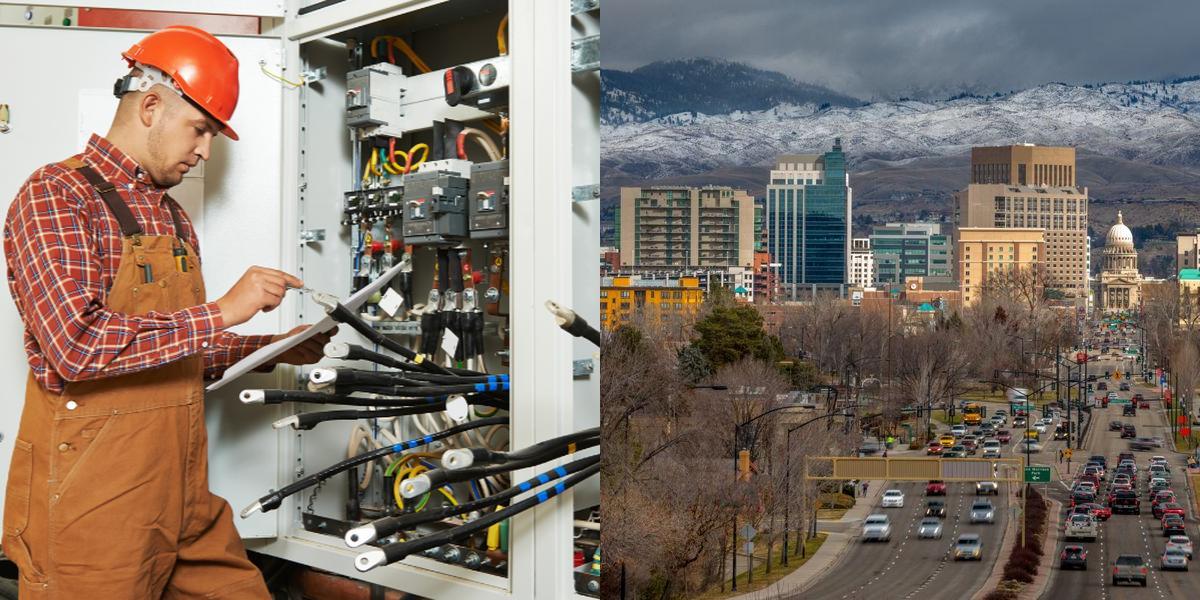How to Become an Electrician in Idaho (2024)

Becoming an electrician is a gateway to a fulfilling career filled with diverse opportunities. In this blog, we'll walk you through the journey to becoming an electrician, from choosing the best electrician school to grasping the potential electrician salary.
Key Points
- An electrician is a skilled professional who handles everything from installing and maintaining electrical systems to troubleshooting issues in homes, businesses, and industrial settings.
- To become an electrician in Idaho, you'll need to complete a high school diploma or GED, go through a 3 to 5-year apprenticeship, and pass the Journeyman Electrician Exam to earn your license.
- Electrician classes in Idaho generally take 4 to 5 years, blending classroom learning with real-world experience to ensure you're well-prepared for the job.
- In Idaho, the average electrician salary is $55,240 per year.
Career Paths and Opportunities after Becoming an Electrician
Becoming an electrician opens doors to various exciting career paths. Whether you enjoy working on residential projects, tackling large commercial installations, or even starting your own business, the possibilities are diverse. Heres a look at some of the career options available to you:
-
Residential Electrician: Specialize in home electrical systems, including installations, upgrades, and troubleshooting. This path allows you to work closely with homeowners and address their electrical needs.
-
Commercial Electrician: Focus on larger projects in office buildings, retail spaces, and industrial sites. Youll handle installations, maintenance, and compliance with safety standards while working alongside other construction professionals.
-
Industrial Electrician: Work in factories, power plants, and manufacturing facilities. This role involves maintaining and repairing complex electrical systems and equipment, often involving advanced technology.
-
Electrical Contractor: Start and manage your own electrical contracting business. Oversee projects, supervise staff, and ensure everything runs smoothly and within budget, offering a path to entrepreneurship and financial growth.
-
Specialized Electrician: Choose a niche such as renewable energy systems (solar or wind), fire alarm systems, or home automation. Specializing can set you apart and open new career opportunities.
-
Teaching or Training: Use your experience to educate future electricians. Technical schools and apprenticeship programs often seek seasoned professionals to share their knowledge and skills.
Frequently Asked Questions
How long does it take to become an electrician in Idaho?
Becoming an electrician in Idaho usually takes about 4 to 5 years. This includes getting your high school diploma or GED, completing a 3 to 5-year apprenticeship that blends classroom learning with hands-on experience, and passing the Journeyman Electrician Exam. This time commitment ensures you're well-prepared with the skills and knowledge needed for a successful career.
How much does it cost to go to electrician school in Idaho?
The cost of electrician school in Idaho can range from $5,000 to $15,000, depending on the school and program length. Some programs might offer financial aid or payment plans to help manage the costs, so its a good idea to explore your options and find a program that fits your budget and career goals.
How much does an electrician make in Idaho?
In Idaho, electricians typically make around $55,240 a year, based on the latest Bureau of Labor Statistics data from May 2023. While this figure can vary depending on your experience, location, and specialization, it reflects a solid earning potential for a career in this field.
Final Thoughts
Becoming an electrician offers a fulfilling career with diverse opportunities. With your certification in hand, you can dive into residential, commercial, and industrial electrical work, or even specialize in cutting-edge technologies. Embrace this chance to build a rewarding careerget certified, stay current, and unlock your potential in this dynamic field.
Wondering if there's more? Perhaps these other articles will be more helpful if this one isn't exactly what you're after:

Fel is a student support representative who guides enrollees to the right program and answers their queries. She's committed to helping students and takes pride in her work. In her free time, she enjoys sightseeing and hanging out with loved ones.




